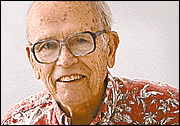


Hawaii’s World
WHY does a bank that once "went public" and sold its stock in the open market decide to reverse course and "go private"? Hawaii National
Bank goes privateWarren K.K. Luke, president and chief executive officer, says it was an easy decision for Hawaii National Bank, founded by his now-ailing father, K.J. Luke, in 1960. The bank became public in 1987 when it placed itself under a holding company -- Hawaii National Bankshares.
Holding companies often are umbrellas for diversification. Hawaiian Electric Co., for example, created a holding company.
It exchanged stockholders' shares for shares in a new parent company, Hawaiian Electric Industries, with the utility as just one of its holdings. Then it put a savings and loan, an insurance company, a tug company, some Asian investments and more under the HEI umbrella. It hoped to generate more profits for shareholders, but so far has had mixed results.
Hawaii National Bankshares didn't add subsidiaries after its shares became publicly sold. It continues to focus on being one of Hawaii's small banks with small businesses as its major clients.
Over the years it was innovative in introducing consumer-friendly practices such as free checking. It now has branches in Hilo, on Maui and in nine Oahu locations -- but never tried to challenge the big guys.
Hawaii National had a cosmopolitan board of directors from the time it was founded but still was recognized as a "Chinese bank," the second one after Liberty Bank, now merged into American Savings.
Like Liberty, Hawaii National located its head office in Chinatown, first in a two-story building, now in a modern seven-story tower at 45 North King.
Its deposits total around $300 million, compared to over $15 billion for Hawaii's big guys. Its stockholder list never grew much beyond 1,200.
As a public company, however, it had to make quarterly filings with the Securities and Exchange Commission. All its financial records, including corporate salaries, went on the Internet. The filing took a lot of lawyer and staff time.
SEC listing improves the marketability of shares, Luke points out, but adds cumbersome, costly procedures and delays decision-making.
Luke said that since the core of the company ownership has remained with the Luke family it just seemed simpler to get rid of the SEC humbug (my word, not his). Public ownership also creates pressures to show ever-increased earnings, whether wisely achieved or not.
AS of Aug. 31, Hawaii National Bankshares executed a reverse stock split to take its number of shareholders down to around 100 -- well under the 300 maximum required to de-list from SEC control.
The exchange rate was one share of new stock for every 200 shares of the old. The old shares were valued at $45 each for conversion purposes, a price set by a mainland evaluator and unchallenged by the old stockholders. Each new share thus had a starting worth of $9,000.
The bank continues to be regulated by the Federal Reserve Board and the Office of the Comptroller of the Currency. Customers continue to be FDIC-insured up to $100,000 per depositor.
For two more years, Luke will continue to be one of the nine directors of the Federal Reserve Bank of San Francisco. He is Hawaii's only member and a recognized voice for small business. He helps feed information up to the national Federal Reserve Board, chaired by Alan Greenspan.
Luke still has his fingers crossed on the future of the Hawaii economy. He will feel more optimistic if construction perks up.
A.A. Smyser is the contributing editor
and former editor of the the Star-Bulletin
His column runs Tuesday and Thursday.